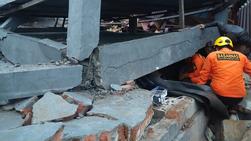 This handout photo taken and released on January 15, 2021 by Indonesia's National Disaster Agency (BASARNAS) shows rescuers looking for survivors trapped in a collapsed building in Mamuju, after a 6.2-magnitude earthquake rocked Sulawesi island.
(HANDOUT / NATIONAL SEARCH AND RESCUE AGENCY / AFP)
This handout photo taken and released on January 15, 2021 by Indonesia's National Disaster Agency (BASARNAS) shows rescuers looking for survivors trapped in a collapsed building in Mamuju, after a 6.2-magnitude earthquake rocked Sulawesi island.
(HANDOUT / NATIONAL SEARCH AND RESCUE AGENCY / AFP)
JAKARTA - A powerful earthquake killed at least 42 people and injured hundreds on Indonesia’s island of Sulawesi on Friday, trapping several under rubble and unleashing dozens of aftershocks as authorities warned of more quakes that could trigger a tsunami.
Friday’s powerful quake struck 6 kilometers northeast of Majene just before 1.30 am on Friday, sending thousands of panicked residents out of their homes and fleeing for higher ground
Friday’s powerful quake struck 6 kilometers northeast of Majene, at a relatively shallow depth of 10 km, just before 1.30 am on Friday, sending thousands of panicked residents out of their homes and fleeing for higher ground.
As many as 42 people have been killed, mostly in Mamuju and the rest in the neighbouring district of Majene, the country’s national disaster mitigation agency said in a situation report on Friday evening. More than 820 people were injured, it said.
The quake and aftershocks damaged more than 300 homes and three hotels, as well as flattening a hospital and the office of a regional governor, where authorities told Reuters several people have been trapped under the rubble.
The heightened seismic activity set off three landslides, severed electricity supplies, and damaged bridges linking to regional hubs, such as the city of Makassar.
ALSO READ: Indonesia quake damages homes, churches as residents return
 The quake did not trigger a tsunami warning, but the head of Indonesia’s Meteorology and Geophysics Agency (BMKG), Dwikorita Karnawati, said at a news conference that strong aftershocks could follow, with a possibility that another powerful quake could trigger a tsunami.
The quake did not trigger a tsunami warning, but the head of Indonesia’s Meteorology and Geophysics Agency (BMKG), Dwikorita Karnawati, said at a news conference that strong aftershocks could follow, with a possibility that another powerful quake could trigger a tsunami.
There had been at least 26 aftershocks in the area in the past day, she said, with Friday’s quake preceded by a 5.9-magnitude quake on Thursday afternoon.
“Praise be to God, for now (the situation) is OK, but we just felt another aftershock,” said 26-year-old resident Sukri Efendy.
Mamuju resident Muhammad Ansari Iriyanto, 31, told Reuters that everyone panicked and sought refuge in the nearby hills and mountains.
“Mamuju is now empty, everyone went to the mountains,” he said. “Lots of buildings collapsed and people are afraid of a tsunami.”
Another resident Syahir Muhammad said: “It’s raining and we need help.”
The quake and aftershocks damaged more than 300 homes and three hotels, as well as flattening a hospital and the office of a regional governor, where authorities said several people have been trapped under the rubble
Pictures of the aftermath appeared on social media as the head of the disaster agency and social affairs minister prepared to visit.
Videos shared on social media showed residents fleeing to higher ground on motorcycles, and a young girl trapped under rubble as people tried to shift debris with their hands. Rescue workers used cutting and lifting equipment to free survivors and find the dead.
READ MORE: Death toll from Indonesian earthquake climbs to 23
President Joko Widodo offered condolences to the victims in a video statement, urging people to stay calm and authorities to step up search efforts.
Emerging workers are now trying to restoring telecoms and bridge links and ensure the delivery of tents, food and medical supplies, said West Sulawesi provincial government spokesman Safaruddin.
About 15,000 people have fled their homes since the quake, the disaster agency has said, with the coronavirus pandemic likely to complicate aid distribution.
“It is certainly one of the most challenging, this (disaster) was one of our fears and now we are putting all of that planning and protocols into place,” said Jan Gelfand, head of the International Federation of Red Cross in Indonesia.
 Residents inspect damaged buildings in Mamuju, West Sulawesi, Indonesia, on Jan 15, 2021, after a 6.2-magnitude earthquake jolted the island. (RUDY AKDYAKSYAH / AP)
Residents inspect damaged buildings in Mamuju, West Sulawesi, Indonesia, on Jan 15, 2021, after a 6.2-magnitude earthquake jolted the island. (RUDY AKDYAKSYAH / AP)
“It is certainly one of the most challenging, this (disaster) was one of our fears and now we are putting all of that planning and protocols into place,” said Jan Gelfand, head of the International Federation of Red Cross in Indonesia.
Straddling the so-called Pacific "Ring of Fire", Indonesia, a nation of high tectonic activity, is regularly hit by earthquakes.
In 2018, a devastating 6.2-magnitude quake and subsequent tsunami struck the city of Palu, in Sulawesi, killing thousands of people.
A 9.1-magnitude quake off the north of Indonesia’s Sumatra island on Boxing Day 2004 triggered a tsunami that swept over coastal areas of Indonesia, Sri Lanka, India, Thailand and nine other countries, killing more than 230,000 people.


